- Home
- Janet Evanovich
Sizzling Sixteen Page 3
Sizzling Sixteen Read online
Page 3
“That’s a shame,” I said. “I know Vinnie brought all this on himself, but it’s still sad.”
I ate two pieces of pizza, chugged a bottle of water, and hiked my bag onto my shoulder.
“Where you going?” Lula wanted to know.
“I have Ranger tracking Mickey Gritch, so I thought I’d take the afternoon to try to find Dirk McCurdle. He’s still in violation of his bond.”
“I thought his name was McCuddle,” Lula said.
“Nickname,” I told her.
The papers branded him McCuddle because he married four women before the state of New Jersey wised up and arrested him. Besides being tagged for bigamy, McCurdle got caught shoplifting some very expensive lingerie. He said social security didn’t give him enough money for him to keep up with the anniversary presents.
“He looks like a nice little old man in his newspaper pictures,” Lula said.
Dirk McCurdle was seventy-two years old, 5′9″ tall, pleasantly plump and pink-cheeked, had wispy white hair and a face like a cherub.
“I have a feeling McCurdle is with one of his wives,” I said. “One is in the Burg, one’s on Cherry Street, and two are in Hamilton Township.”
“Hold on,” Lula said. “I’ll go with you in case one of those wives gets out of hand and you need backup.”
I glanced at the file Connie had given me. McCurdle’s first wife was his age. All the other wives were in their late seventies. Probably, I could handle them.
“Anyway, I never saw any bigamist wives,” Lula said. “I want to see what they look like.”
I THOUGHT I’D start with the most recent wife and work my way back. Margaret McCurdle lived in a garden apartment in Hamilton Township. The buildings in the complex were two-story redbrick with white doors and white shutters at the windows. There were ten apartments in each building. Five up and five down. Margaret lived in an end unit on the ground floor.
“This looks real normal,” Lula said, swinging out of my Jeep, taking in the faux colonial columns in the front of the building. “This don’t look like a bigamist hide out. I hope I’m not gonna be disappointed. I hate when that happens.”
We crossed the lot to the front door and I rang the bell.
The woman who answered the door was about five foot nothing. Her hair was pale blond and cut short. Her makeup reminded me of pictures of Japanese geisha. Exaggerated bow mouth painted with glossy bright-red lipstick, white pancake makeup, and pencil-thin black eyebrows. She was wearing a magenta velour warm-up suit and white tennis shoes.
“Are you Margaret McCurdle?” I asked her.
“Yes. You aren’t more wives, are you?”
“No.”
“Thank goodness,” she said. “I can’t keep track of them anymore. I don’t know how Dirk does it. He has wives coming out of the woodwork.”
I gave her my card. “I’m a bond enforcement agent,” I told her, “and I’m looking for Dirk.”
“Good luck,” Margaret said on a sigh. “I’ve given up looking for him. He went out for ice cream two weeks ago and never came back. And now it turns out I’m wife number four. I read about it in the paper. I suppose I should get a lawyer, but they’re so expensive.”
“What’s it like being married to a bigamist?” Lula asked her.
“It’s perfect,” she said. “He told me he was still managing his company in Des Moines. So he would show up on Thursday night in time to set the garbage out for Friday pickup. And then he would leave early Sunday. He was very attentive, and he was always a gentleman. And he was excellent in bed.”
“No kidding,” Lula said. “You and McCuddle have a lot of sex?”
“No, but we talked about it.”
“Do you know where he is now?” I asked her.
“Jail?”
“Not yet,” I said.
Lula and I said good-bye to Margaret McCurdle, and I drove us a half mile to Ann McCurdle’s house on Sycamore Street. Ann lived in a small ranch house in a neighborhood filled with small ranch houses. Her house was pale gray, with blue shutters and a blue door. Her yard was tidy, and it looked like someone had just mulched around her azalea bushes.
“This is fascinating to me,” Lula said, “because I’m a student of human nature. That’s why I was such a good ’ho. I took an interest in my clients. And now here I am seeing all these bigamist wives living in all these different kinds of houses. Don’t you think it’s fascinating?”
Actually, it wasn’t high on my list of things that fascinated me, but I thought it was nice that Lula was fascinated.
I rang Ann’s doorbell with Lula hovering behind me. I rang a second time and the door was answered by a wiry old lady with a paintbrush in her hand. She had gray hair the color and texture of steel wool, her bifocals were crooked on her face, and she was dressed in white orthopedic shoes and a shapeless cotton creation that was somewhere between a dress and a bathrobe.
“Mrs. McCurdle?” I asked her.
“Yeah,” she said. “Me and everybody else.” She craned her neck to look past Lula. “This isn’t another one of them television interviews, is it? I’m painting my kitchen, and I don’t have my hair fixed.”
I introduced myself and gave her my card. “I’m looking for your husband,” I told her. “Do you have any idea where he might be?”
She pushed a clump of hair back from her face and left a smudge of lemon yellow paint. “I don’t know where he is, and if you find him, I want to know so I can hunt him down and wring his neck. He started painting my kitchen this stupid yellow color three weeks ago and never came back to finish.”
“It’s gonna be real cheery when you get done,” Lula said.
“Cheery, my behind,” Ann McCurdle said. “Every time I look at it, my blood pressure goes up. I’m popping pills like they’re M&M’s.”
“So I guess marrying a bigamist didn’t work out for you,” Lula said.
“It could have been worse. Just when I was getting sick of him, he’d go off on a two-week business trip. That’s the secret to keeping the magic in a marriage,” she said. “You don’t see too much of each other. Men are only interested in one thing anyway. S-E-X. And then after they get it, they go to sleep and snore.”
“I noticed that,” Lula said.
I thanked Ann McCurdle for her help, and Lula and I went back to the Jeep.
“Maybe bigamists aren’t as fascinating as I thought,” Lula said, cinching her seat belt. “According to the newspaper, none of these wives knew there were other wives. Now that I’m meeting them, I could see how that could happen.”
I motored out of the lot and turned onto Klockner Boulevard. “His first wife lives in the Burg. I thought we’d try her next, since it’s on our way back to the office.”
The Burg is an odd-shaped chunk of Trenton bordered by Hamilton Avenue, Liberty Street, Chambers Street, and Broad Street. I lived in the Burg for my entire childhood, and my parents still live there. Houses are small, yards are narrow, cars are large, windows are clean. This is a neighborhood of hard working second-generation Americans. Families are extended and proudly dysfunctional. Although dysfunction in Jersey might be hard to measure.
Tomasina McCurdle lived one block in from Hamilton in a single-family house with brown clapboard siding and brown trim.
“This house looks like a turd,” Lula said. “How could someone live in a all-brown house? You’d think you were going into a turd every day. It’s just my opinion, but I’d find that depressing. When you had company over, what would you tell them? The directions would be to turn off Hamilton and park in front of the house looks like a turd.”
I had to admit, it wasn’t the most attractive house I’d ever seen, but turd seemed harsh. Truth is, the bottom half of my parents’ house was brown, and okay, if I was being honest, it wasn’t such a great-looking house, either.
I knocked at the door and a sturdy woman answered. She was early seventies, short black hair shot with silver, wire-rimmed glasses, dressed in a green pants
suit, large pearl earrings, lots of perfume.
“Tomasina McCurdle?” I asked.
“That’s me,” she said. “And I know who you are, too. You’re Edna’s granddaughter. The one who burned down the funeral home.”
“It wasn’t my fault,” I told her. “People were shooting at me.”
“I suppose you’re looking for my foolish husband, the bigamist.”
“We sure are,” Lula said. “And if you don’t mind me asking, what was it like being married to a bigamist?”
“It was like being married to anyone else.”
“That’s disappointing,” Lula said.
Tomasina pressed her lips together. “Tell me about it. I was married to that idiot for fifty-one years, and ten years ago, he decided to just up and marry someone else. And then he goes and marries every floozy that comes along. What the heck was he thinking?”
“Do you know where I might find him?” I asked her.
“I imagine he’s with one of his home wreckers.”
“Other than homewreckers, is there any place else he might be staying? A relative’s house? A close friend?”
“I can’t see him with any relatives. His brother died last year. His parents are dead. Our son lives in Delaware, and he’d tell me if Dirk was with him. Ernie Wilkes is his best friend, but Ernie’s wife wouldn’t put up with having Dirk in the house.”
“You look all dressed up,” Lula said. “Are you going out someplace?”
“No. I just got home. I was at Karen Shishler’s afternoon viewing at Stiva’s.” Tomasina turned to me. “Your grandmother is there causing a scene because there’s a closed casket. The viewing was over, and she refused to leave until they opened the casket.”
“Thanks,” I said. “If you see Dirk, please call me.”
FOUR
THREE MINUTES LATER, we were in front of Stiva’s funeral home. It was on its third owner since Stiva, but it was still called Stiva’s.
“I guess you’re gonna go get your granny,” Lula said.
“Yeah. I’ll just check to see if she’s still here.”
“I’m gonna wait in the car if it’s okay with you,” Lula said. “Not that I’m afraid of dead people or anything, but it gives me the willies.”
Stiva’s is housed in a big white colonial on Hamilton. The front steps are covered in green outdoor carpet, and they lead to a wide front porch that spans the width of the house. I walked into the large lobby and heard Grandma arguing with the funeral director in slumber room number three.
“How do I know she’s in there if you won’t open the lid?” Grandma said.
“You have my word of honor,” he told her.
Mitchell Shepherd owns the funeral home. He bought it a year ago and probably regrets his decision. People in the Burg take their funeral homes seriously, and since the Burg lacks a movie theater or mall, the funeral home is most often the entertainment of choice. Shepherd is a mostly bald man in his fifties. He has a round face, round body, and his funereal uniform is navy suit, white shirt, navy striped tie.
“Just a peek,” Grandma said. “I won’t tell no one.”
“Can’t do it. The family wants the casket closed.”
Grandma Mazur came to live with my parents when Grandpa Mazur passed on to wherever it is that bacon-eating, whiskey-drinking, gravy-loving people pass on to. She’s five foot five on a good day, has tightly permed gray hair, a body that’s mostly slack skin on spindle bones, and an attitude only old ladies can pull off.
“I made an effort to come here today, and what good is it if I can’t even see the deceased?” Grandma said. “Next time, I’m going to Morton’s Mortuary. They never have closed caskets.”
Shepherd looked like he’d pay Grandma to go to Morton’s. He glanced my way and almost collapsed with relief.
“Stephanie!” he said. “How nice to see you.”
“Well, for goodness sakes,” Grandma said. “Look who’s here. Did your mother send you after me?”
“No. I heard you were creating a disturbance, and I came on my own.”
“Just in time to give me a ride home,” Grandma said. “No reason to stay here any longer, since Mr. Party Pooper won’t open the lid for me.”
I escorted Grandma out of the funeral home and she stopped short when she saw the Jeep.
“Isn’t this a cute little thing,” she said. “This is a pip of a car. I always wanted to ride in one of these. How the heck do I get into it?”
Lula climbed into the backseat and reached a hand down to Grandma. I got my hand under Grandma’s behind, and we alley-ooped her into the passenger seat.
“Good thing you came when you did,” Grandma said. “By the time I walked home, I’d be late for dinner, and we’re having pot roast tonight. It wouldn’t be right to be late for pot roast.”
“I love pot roast,” Lula said. “I bet you’re having mashed potatoes and gravy with it, too. I love mashed potatoes and pot roast gravy.”
“You should stay for dinner,” Grandma said. “We always got extra.”
“If you’re sure it’s no trouble,” Lula said. “I wouldn’t want to impose. And I won’t eat much on account of I’m on this new diet where I only eat one thing. Like, I only eat one piece of pot roast and one glob of mashed potatoes and one green bean.”
“Have you lost weight?” Grandma asked.
“Not yet, but I only just started. I’m still getting the hang of it. Like, what happens when you eat salad? Does it mean you eat one salad? Or does it mean you eat one piece of lettuce and one piece of tomato? It don’t matter a lot, since I don’t understand the whole salad obsession anyway. Lettuce don’t look like a food to me. And if you’re gonna eat a tomato, I say put it on a burger.”
My parents live in a two-family house. They share a common wall with Mrs. Markowitz, and both halves of the house are identical in construction. Living room, dining room, kitchen downstairs. Three small bedrooms and one bath upstairs. Mrs. Markowitz has lived next door to my parents for as long as I can remember. Her husband died years ago, and she lives alone now, making coffee cake and watching television. She’s painted her half of the house lime green. My parents have always had their house brown on the bottom half and mustard yellow on the top. I don’t know why. I expect it’s a Trenton thing.
The house hasn’t changed much over the years. A new appliance when needed. New curtains. Mostly, it’s overcrowded with comfortable non descript furniture, cooking smells, and good memories.
My mom has always been a homemaker. She’s a younger, more filled-out version of my grandma Mazur, and I think I’m cut from some of the same cloth. I have their good metabolism, oval-shaped face, and blue eyes.
My dad is retired from the post office, and now he drives a cab part-time. I get my unruly hair from his side of the family. And also my perverted cousin Vinnie.
The table was set for three when we walked in. My mom quickly added two more place settings, and in minutes, my father had his head bent over his plate, forking in meat and potatoes, and my mother was at the other end, trying not to stare at Lula’s fire-engine red hair and tiny leopard-print top that showed about a quarter of a mile of cleavage.
“Isn’t this nice,” Grandma said, looking around the table. “I love when we have guests. It’s like a party. What were you two doing in the neighborhood?” she asked me. “Were you looking for dangerous criminals?”
“We were looking for Dirk McCurdle,” I told her.
“Wasn’t that a scandal?” Grandma said. “Imagine having four wives. No one even suspected. He was such a pleasant man. I would see him at the funeral parlor when the Knights of Columbus would have a ceremony.”
“Do you have any ideas where he might be hiding?”
“Did you try all his wives?” Grandma asked. “One of them might still have a soft spot for him.”
“I have one left.”
“If that don’t work, you could try Pip’s bottle,” Grandma said.
My mother blew out a si
gh, and my father murmured something that sounded like crazy old bat.
“Is that the red bottle you’re talking about?” Lula said. “The one looks like a beer bottle?”
Grandma helped herself to the mashed potatoes. “Pip swore by that bottle. He said it brought him luck.”
“How does it work?” Lula wanted to know. “Is it enough to own it? Do you gotta carry it around? Do you have to rub it like a genie bottle?”
“I don’t know exactly,” Grandma said. “I never saw Pip use it.” She looked over at me. “Didn’t it come with instructions?”
“No.”
“Bummer,” Grandma said.
“The bottle is a bunch of horse pucky,” my father said. “Pip was a nut. He didn’t know enough to come in out of the rain.”
“What about when he won $10,000 in the lottery?” Grandma asked. “How do you explain that?”
“Dumb luck,” my father said.
“Exactly!” Grandma said. “It was the lucky bottle.”
“What about taking a leak in a thunderstorm and electrocuting yourself?” my father said. “Was that lucky?”
“Probably he didn’t have the bottle with him,” Grandma said.
“What happened to my pot roast?” Lula asked.
“You ate it,” Grandma said.
Lula stared down at her plate. She looked in her lap and on the floor. “Are you sure I ate it? I don’t remember.”
“I saw you,” Grandma said. “It was the first thing you ate.”
“Do you think eating something counts if you don’t remember?” Lula asked.
No one knew what to say. And my father wasn’t going to touch it.
Lula looked down at her plate. She had a spoonful of mashed potatoes and a pea. “What’s for dessert?” she asked. “It better not be grapes.”
LULA AND I were back in my Jeep, heading for Stark Street to check out Sunflower’s funeral home. It was almost eight o’clock, and the sun was low in the sky. I’d stopped at my apartment to get a sweatshirt, and Lula had insisted we bring the lucky bottle with us.

 Full Scoop
Full Scoop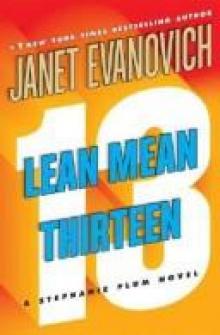 Lean Mean Thirteen
Lean Mean Thirteen One for the Money
One for the Money Full Speed
Full Speed Top Secret Twenty-One
Top Secret Twenty-One Turbo Twenty-Three
Turbo Twenty-Three Dangerous Minds
Dangerous Minds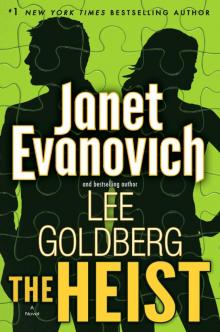 The Heist
The Heist Takedown Twenty
Takedown Twenty Two for the Dough
Two for the Dough Twelve Sharp
Twelve Sharp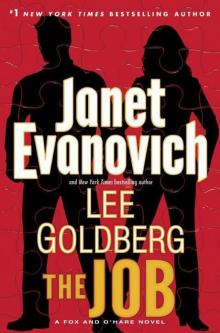 The Job
The Job Metro Girl
Metro Girl Full House
Full House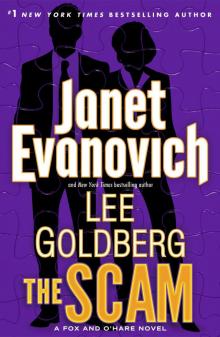 The Scam
The Scam Hot Stuff
Hot Stuff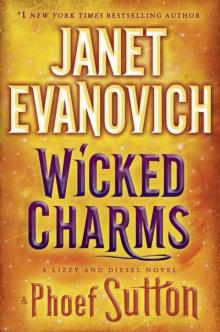 Wicked Charms
Wicked Charms Hero at Large
Hero at Large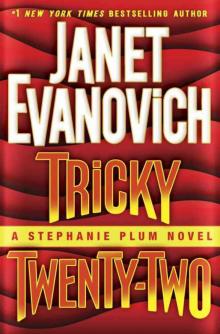 Tricky Twenty-Two
Tricky Twenty-Two Plum Lovin'
Plum Lovin' Eleven on Top
Eleven on Top The Shell Game
The Shell Game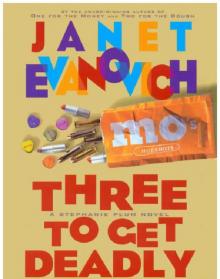 Three to Get Deadly
Three to Get Deadly Four to Score
Four to Score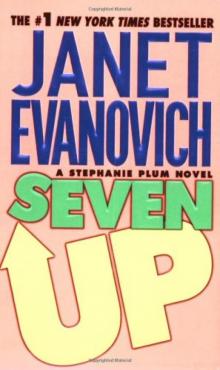 Seven Up
Seven Up High Five
High Five Hot Six
Hot Six The Grand Finale
The Grand Finale Hard Eight
Hard Eight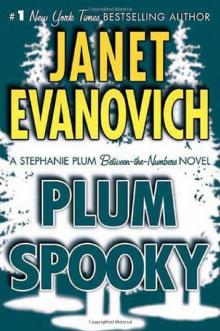 Plum Spooky
Plum Spooky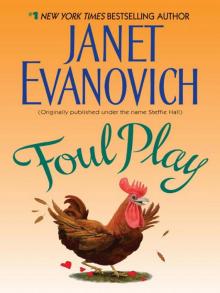 Foul Play
Foul Play Ten Big Ones
Ten Big Ones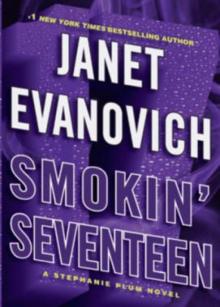 Smokin' Seventeen
Smokin' Seventeen Fearless Fourteen
Fearless Fourteen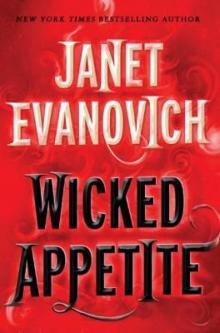 Wicked Appetite
Wicked Appetite Curious Minds
Curious Minds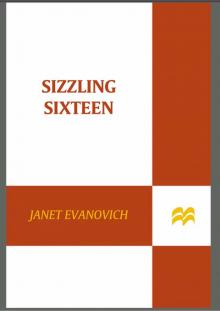 Sizzling Sixteen
Sizzling Sixteen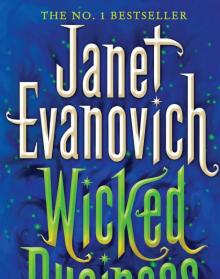 Wicked Business
Wicked Business The Big Kahuna
The Big Kahuna Explosive Eighteen
Explosive Eighteen Visions of Sugar Plums
Visions of Sugar Plums Full Blast
Full Blast Back to the Bedroom
Back to the Bedroom Finger Lickin' Fifteen
Finger Lickin' Fifteen Smitten
Smitten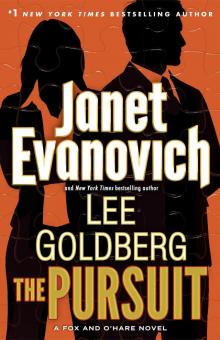 The Pursuit
The Pursuit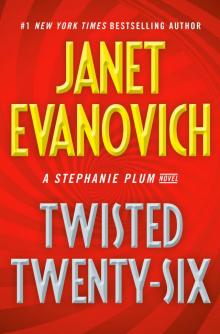 Twisted Twenty-Six
Twisted Twenty-Six Love in a Nutshell
Love in a Nutshell The Chase
The Chase Notorious Nineteen
Notorious Nineteen Hardcore Twenty-Four
Hardcore Twenty-Four The Rocky Road to Romance
The Rocky Road to Romance Twisted Twenty-Six (Stephanie Plum 26)
Twisted Twenty-Six (Stephanie Plum 26) Manhunt
Manhunt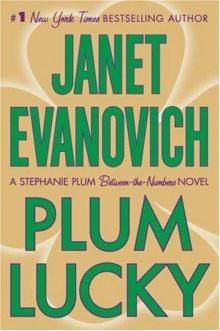 Plum Lucky
Plum Lucky Full Bloom
Full Bloom Wife for Hire
Wife for Hire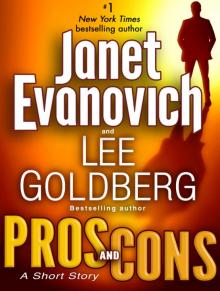 Pros and Cons
Pros and Cons Fortune and Glory
Fortune and Glory Motor Mouth: A Barnaby Novel
Motor Mouth: A Barnaby Novel Naughty Neighbor
Naughty Neighbor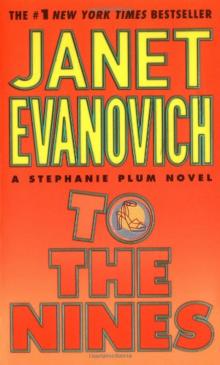 To the Nines
To the Nines The Husband List
The Husband List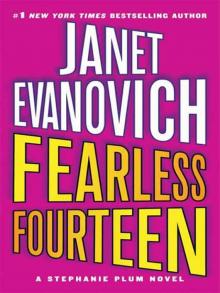 Fearless Fourteen: A Stephanie Plum Novel
Fearless Fourteen: A Stephanie Plum Novel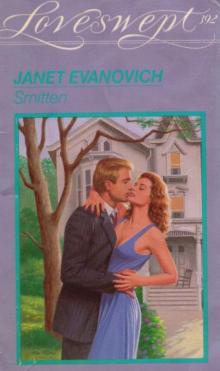 Smitten - LOVESWEPT - 392
Smitten - LOVESWEPT - 392 Plum 12 - Twelve Sharp
Plum 12 - Twelve Sharp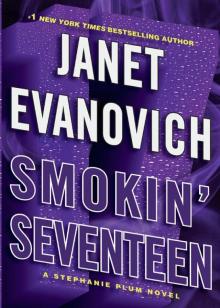 Smokin' Seventeen: A Stephanie Plum Novel (Stephanie Plum Novels)
Smokin' Seventeen: A Stephanie Plum Novel (Stephanie Plum Novels) Top Secret Twenty-One: A Stephanie Plum Novel
Top Secret Twenty-One: A Stephanie Plum Novel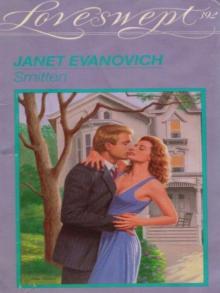 SMITTEN (Loveswept, No 392)
SMITTEN (Loveswept, No 392) Plum 10 - Ten Big Ones
Plum 10 - Ten Big Ones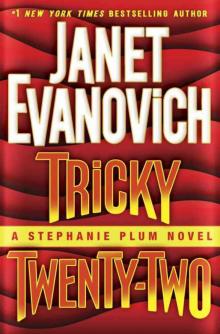 Tricky Twenty-Two: A Stephanie Plum Novel
Tricky Twenty-Two: A Stephanie Plum Novel Look Alive Twenty-Five
Look Alive Twenty-Five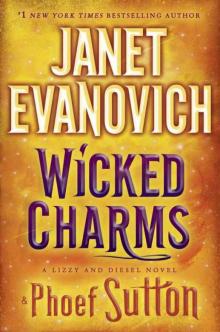 Wicked Charms: A Lizzy and Diesel Novel
Wicked Charms: A Lizzy and Diesel Novel Motor Mouth
Motor Mouth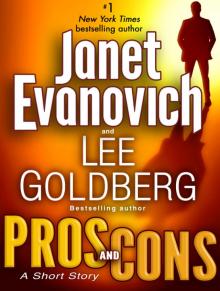 Pros and Cons: A Short Story
Pros and Cons: A Short Story The Shell Game: A Fox and O'Hare Short Story (Kindle Single)
The Shell Game: A Fox and O'Hare Short Story (Kindle Single) Plum Boxed Set 1, Books 1-3 Stephanie Plum Novels)
Plum Boxed Set 1, Books 1-3 Stephanie Plum Novels)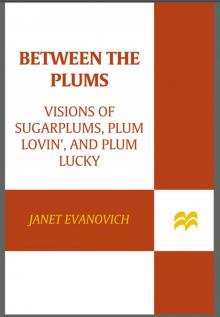 Between the Plums
Between the Plums